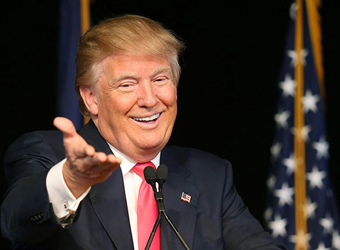U.S. President Donald Trump’s administration took the dispute over his temporary travel ban to the Supreme Court again, asking the justices to let the government bar entry into the U.S. by people with grandparents and cousins in the country.
The administration filed papers late Friday asking the court to clarify a June 26 decision that said the government had to admit at least some close relatives, including spouses and parents-in-law. A federal trial judge in Hawaii this week said the government couldn’t exclude several other types of family members either, and the administration is seeking to free itself from that ruling.
That ruling “distorts this court’s decision and upends the equitable balance this court struck,” acting U.S. Solicitor General Jeffrey Wall said in court papers.
The Supreme Court told the challengers to the ban to file a response by noon Washington time on July 18.
The Supreme Court already has agreed to hear arguments in the fall on Trump’s 90-day ban, which applies to people entering the U.S. from six mostly Muslim countries. The June 26 ruling said a limited form of the ban could take effect in the meantime, allowing only people with a “credible claim of a bona fide relationship with a person or entity in the United States” to enter.
The limited travel ban took effect June 30. The Trump administration announced it would let people enter the U.S. who had a parent, spouse, fiance, child, sibling, son- or daughter-in-law, or a parent-in-law in the country. The standard excluded those whose closest connections were grandparents, grandchildren, aunts, uncles, nieces, nephews, cousins, and brothers- or sisters-in-law.
U.S. District Judge Derrick Watson ruled Thursday that the government’s exemption from the ban was too narrow. “Common sense, for instance, dictates that close family members be defined to include grandparents,” Watson wrote.
The Supreme Court had said people with a “bona fide relationship” included those visiting a close family member, students who have been admitted to a university, or workers who have accepted an employment offer.
In announcing the administration would immediately take the matter to the Supreme Court, Attorney General Jeff Sessions said in a statement Friday, “Once again, we are faced with a situation in which a single federal district court has undertaken by a nationwide injunction to micromanage decisions of the co-equal executive branch related to our national security.”
Trump’s March 6 executive order said the 90-day travel ban would give officials time to assess U.S. vetting procedures and would address an “unacceptably high” risk that terrorists could slip into the country. Lower courts blocked the ban, saying Trump overstepped his authority and unconstitutionally targeted Muslims.
When the Supreme Court partially revived the travel ban in June, Justices Clarence Thomas, Samuel Alito and Neil Gorsuch said they would have let the entire ban take effect immediately. Thomas warned that the definition of bona fide relationships would open the door to a “flood of litigation” as U.S. customs and border officials wrestle with whether travelers from the six countries have sufficient ties.
In its new court filing, the Trump administration asked the court to block Watson’s order temporarily while the justices consider the motion to clarify.
The administration also said Watson was wrong to permit more refugees to be admitted under a separate provision in Trump’s executive order. Watson said the government couldn’t exclude refugees once a resettlement agency has provided a formal assurance that it will provide basic services for the person.
In a separate filing Saturday, the Trump administration also asked a San Francisco-based federal appeals court to put Watson’s decision on hold. The two filings overlap, and the appeals court could defer action until it sees what the Supreme Court does.
Source: Bloomberg


